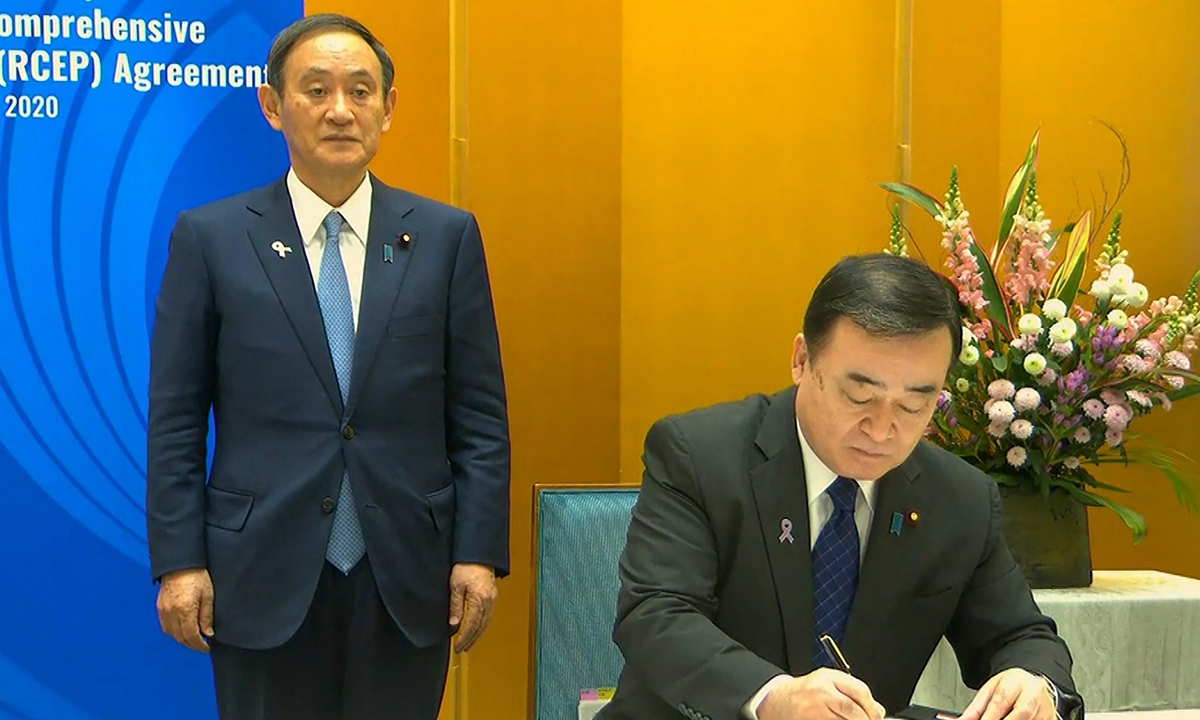Japan needs to double down with RCEP
By Jiao Kun Source: Global Times Published: 2020/11/15 21:36:56

A screen grab taken from Vietnam Host Broadcaster's November 15, 2020 live video shows Japan's Prime Minister Yoshihide Suga (left) standing next to Japan's Minister of Economics, Trade and Industry Hiroshi Kajiyama as he signs the agreement during the signing ceremony for the Regional Comprehensive Economic Partnership (RCEP). Photo: AFP
On Sunday, 15 Asia-Pacific countries concluded their negotiations over the Regional Comprehensive Economic Partnership (RCEP), kicking off the world's biggest free-trade deal. The newly formed free-trade zone is set to encompass a population of 2.2 billion and roughly a third of the global GDP. It integrates 10 ASEAN countries, as well as China, Japan, South Korea, Australia and New Zealand into one giant market.The road leading to the final agreement has been a long and bumpy one, full of hard negotiations and setbacks - such as India's withdrawal from it last year. Yet most countries see great promise of economic prosperity in the deal and have chosen to embrace free trade while the menace of protectionism looms around most corners of the world.
For countries like Japan, the need for open and reciprocal trade mechanisms has never been more urgent. With quite limited natural resources and a rather small domestic market, Japan is destined to develop an export-oriented national economy. Adding to this in this new era of globalization, many Japanese producers have been rationalizing and re-organizing their supply chains through international cooperation, and shifting their production abilities overseas. Frameworks that bolster and institutionalize trade among countries open the door to potential markets deserve to be cheered and celebrated by the Japanese business community - particularly the RCEP deal.
In fact, Japan has been keenly involving itself in negotiations with multiple trade deals in recent years, and sometimes initiates them. Following the Japan-EU Economic Partnership Agreement (EPA), which came into effect in the beginning of last year, Japan has also clinched the EPA with the UK. Moreover, the US-Japan Trade Agreement (USJTA) entered into force on January 1, 2020. In fact, long before these new partnerships took shape, Japan has been engaging in talks over trade agreements with over a dozen Asia-Pacific countries.
What speaks most loudly for Japan's enthusiasm toward international free trade mechanisms is the active role it had played in the TPP talks after the Donald Trump administration pulled out. As a close political and military ally of the US, Japan did not follow Trump's path of economic isolationism - it rather made strenuous attempts to steer the negotiations out of a deadlock, and managed to reshape and revive the TPP as TPP 11 or CPTPP (Comprehensive and Progressive Agreement for Trans-Pacific Partnership).
Whereas Tokyo has repeatedly manifested its inherent preference toward open trade partnerships, it is surprising that some of its policymakers and advisers are showing mixed feelings toward the RCEP. Some commentaries even claim that Japan is only accepting this mega deal with hesitation. What irritates these people is the concern that the RCEP may hand amplified regional influence to Japan's neighbor, China.
As a country that lives off trade, Japan sometimes fails to guard its economic interests from irrelevant considerations. But the RCEP is just a trade arrangement. It is neither a geopolitical organization like the NATO nor a political-military alliance like the one between Tokyo and the Washington. Indeed, China is the biggest economy among all the participants. Yet all of them are bound by the same rules. And all of them benefit from cooperating with each other.
Indeed, the global economy now needs to champion free trade more than ever as the pandemic rages and the world's largest economy wages blatant protectionist policies on other countries under the Trump administration. The RCEP is the fruit of more than a dozen countries' hard work over long years. It exemplifies billions of people's resolve to fend off economic isolationism. It should not be degraded or be thrown off course due to one single country's political agenda.
To be clear, Japan is not above resorting to economic means to pursue political goals. The most recent example is the economic sanctions it imposed on its another neighbor, South Korea, as the result of disputes over historical issues. At one period during the RCEP talks, Japan once insisted that India should also be included in the deal. It even once claimed to withdraw if India was not going to join, mostly out of the hope to counter China's clout.
However, Japan still ended up doing business with its Asian-Pacific neighbors, including China and South Korea. Maybe in the minds of some Japanese officials and politicians, cramming part of the Indo-Pacific Strategy or the QUAD into the RCEP is something worth trying. But to be honest: trade is trade, and it's in Japan's own interest to focus on trade.
The author is a lecturer at the School of History, Wuhan University. opinion@globaltimes.com.cn
Posted in: ASIAN REVIEW